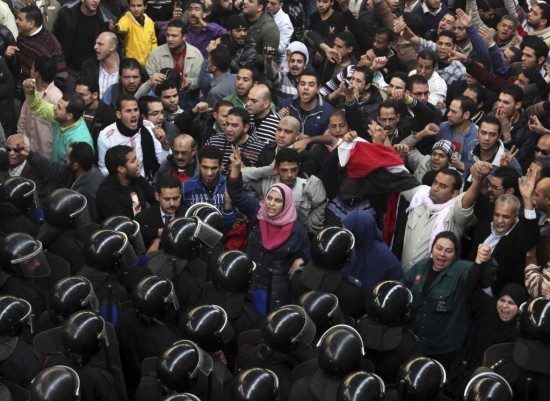Maged Zaher: Poetry and revolution

Early on in the Arab Spring, we began to hear rumors about the role poetry was playing in the uprisings. In Egypt especially, as Elliott Colla reported as early as January 31 2011 (in a piece entitled “The Poetry of Revolt,” from jadaliyya.com), people “would never dare to protest publicly without an arsenal of clever couplet-slogans.” A catchy example provided by Colla: "Shurtat Masr, yâ shurtat Masr, intû ba’aytû kilâb al-’asr" ("Egypt's Police, Egypt's Police, You've become nothing but Palace dogs"). “This poetry is not an ornament to the uprising,” Colla concludes—“it is its soundtrack and also composes a significant part of the action itself.”
Into this matrix of poetry and revolt steps Seattle based, Cairo born Maged Zaher, with his new collection, The Revolution Happened and You Didn’t Call Me, published by the redoubtable TishFish Press. The title only just recalls Gil Scott-Heron’s “The Revolution Will Not Be Televised,” except that in Zaher’s version it is less a structural problem of the revolution’s mediation than it is a personal problem: “you didn’t call me.” When a revolution happens in your hometown—and you are in exile—it’s not a matter of the personal being political, but the political becoming all too personal.
Zaher’s personal affront at being left out of the revolution is for the most part ironic: a stance from which to launch humorous attacks on both “the regime” and those taking either a too-casual, or too uncritically enthusiastic, approach to the unfolding events. Indeed, in these short, aphoristic poems (which read like the wry observations of a modern day Diogenes) we find all the ironies and strange, jarring contradictions of a revolution irrupting in the midst of a rapidly globalizing city—of the confusion of whether it is neoliberalism’s “freedom” to shop, or the working classes’s “freedom” from toil that is being fought for.
In a city under heavy rebranding
There are bearded men
And lovers
Walking to McDonald’s
(The one next to the armored vehicle)
It is not always easy to tell, and Zaher’s speaker—skeptical, a little world-weary, and a sharp observer of social mores in the midst of turmoil—walks a fine line between doubt and enthusiasm. Here are two examples (the poems rarely exceed five lines on a page):
Despite the ruling elite
We can now park for free downtown
And watch the masses
Engage—kindly—in border disputes
*
During street battles
It is considered appropriate to cuss
At the officer who fired the last
Tear gas canister
From the safety of his tank
Another poem reads: “Plastic consumption spree / Class struggle all the time.” Reminiscent of Pound’s imagist metro station, Zaher turns an ironic juxtaposition in which continuing empty consumption grates against the continuing class struggle. There may be a jibe here, amidst the coffee shops and dilettantism these poetic fragments drift amongst, at the sort of dabblers who talk revolution from the comfort of the “right side of the tracks,” an “old left,” as Zaher writes, who “are fashion conscious,” “the remaining communists / In a postmodern version of everything.” However, more often than not the target of the poems in The Revolution Happened is the state and its ham-fisted attempts to punish dissent and forestall social change:
If you follow the attached link
The state will happily deliver its violence to your computer
*
Nationhood is mostly a practice
Killing demonstrators (for instance)
I’m uncertain at times how to read this book: is it a serial poem? Or a collection of discrete aphoristic fragments that revolve around the Egyptian uprising and the author’s travel from Seattle to Cairo and back again? The question might be better framed around the issue of totality: what does all this add up to? Zaher’s is a book that is propelled by “the desire to track the world’s incomplete transformations”—it is set squarely in the midst of social and personal confusions, and like a series of photographs it captures moments of the daily life of an entire culture engulfed in change. It is necessarily “incomplete.”
Robert F. Worth, writing in the New York Times Magazine (“Egypt’s Next Crisis,” May 27 2011), similarly notes the revolution of daily life in Cairo:
Sitting in traffic, I saw bumper stickers proclaiming: “As of today, I won’t run traffic lights,” and “I will change.” Posters have appeared on walls across Cairo urging Egyptians to stop littering, stop cheating, stop putting up with police abuse and sectarian slurs.
Maged Zaher seems stuck in the same traffic jam. Only he has abandoned the car, and set out into the streets and cafes on foot. It’s not a bad place for a poet to be, in the middle of a revolution, the exact character of which is still to be determined. Remember: “the revolution will be live.” But remember too, “The state promises to stay at the same distance from all poetic schools.” These poems are everywhere measuring that “distance,” both from an unsettling proximity and a casual distance, as the poet readies to lob his couplet-powered stones.
Neighbouring zones